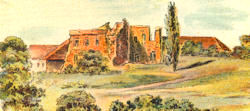Luck Parish History
The Parish of Luck (1899)
The city of Luck became the seat of a new parish ("permanent adjunct") for the southern part of the County of Luck. It contained 24 chapel communities and about 6400 parishioners. This number had increased to 10,000 by 1913. Services in Luck were at first held in private homes, the Luck Gymnasium, and even in a Jewish home in the suburbs. In 1902 the city donated the property of a former Carmelite cloister on condition that a church be built on it and the Karmeliterstrasse be paved. The Gothic-style church was duly erected by 1907. The church's principal Elder, Julius Rosenbaum, played an important role in this project.
The Russian military took Pastor Loppe (along with other pastors) hostage for ten days in 1915 to ensure that all parishioners would accept exile without resistance. In 1918, the returned colonists, all quartered in the church building, invited him to return as pastor, but unfortunately he died of typhus the following year. His brother, Siegfried Oskar Loppe tried briefly to take his place. Since he was from Suwalki, which was within the Warsaw Consistory, this marked perhaps the beginning of the transfer of the western Volhynian parishes from the direction of the St. Petersburg Consistory to that of Warsaw. Later that year, Pastor Bergmann was sent by that Consistory from Cholm to Luck. The church recovered well under the leadership of Pastor Kleindienst, who held services in Polish once a month. New chapels and schools were built in Zielona, Harazdza and Kadyszcze, and others were repaired. The "Schwabenkolonie" of Gnidawa especially provided impetus and funds for building projects, including a new manse in 1928. Under Kleindienst, the parish published the Wolhynischer Bote from 1927 to 1935, and the Wolhynischer Volkskalender from 1936 to 1938. Kleindienst was extremely active in civic and economic affairs. He was on the boards of several charitable institutions, and was head of a "Taskforce of German pastors of the Evangelical-Augsburg Church in Poland".
In spite of his positive contributions, he and Luck ran into severe problems in 1938 with the government and the Church Consistory. The 3-class school in the town, the largest in Volhynia, was closed by the school authorities in Rowno in March of that year. The church in Luck appealed to the government and to the Consistory, but to no avail, in spite of the church's threat to close down the daily market on the Platz by the church! The Consistory also asked for a German assistant-pastor in place of a new vicar, Otto Frank, but this request was also denied. Frank was intended to replace Pastor Kleindienst, who was to be removed from his position, and from Volhynia, on a technicality--his "pass" of 1923 did not suffice to prove his Polish citizenship. Kneifel is quite sure that behind all this trouble stood the figure of the "polonizing"
Pastors in Luck Parish
| 1899 – 1904 | Arnold Friedrich HOFFMANN |
| 1905 – 1911 | Woldemar Alexander SCHLUPP |
| 1911 – 1915 | Siegmund August LOPPE |
| 1918 – 1919 | Siegmund August LOPPE |
| 1919 – 1921 | Theodor BERGMANN (aus Cholm) |
| 1921 – Okt. 1938 | Alfred Rudolf KLEINDIENST |
| Oktober 1938 – | administriert von Otto FRANK, Vikar |
Evangelical Congregations in Luzk Parish
| Adamow+ (near Oderade) | Janowka*+~ (near Tortschin) | Nowaja Semlja (Nowaja Kotowskaja)+ |
| Alexandrin | Josefine+ (near Gorodok) | Oliuka+ |
| Alt-Antonowka*+~ | Kadischtsche (Kadyszcze)+~ | Oseriane (Beljajewskoje Oseriane) |
| Antoniewka (near Podhaizy or Podhaitsch) | Karlinowka+ | Ploschtscha (Ploschtscha-Lomanowskaja)+ |
| Beljajewskoje Oseriane | Kolodesh (Natalin-Kolodesh)*+ | Poddubiz+ |
| Bogumilow+ (near Okorsk) | Kutschkarowka+ | Podhaitsch (Antoniewka-Podhaizy)+ |
| Bonassuwka+ | Lidowka+ | Pulganow+ |
| Choika-Popowka+ | Lipowez+ | Roshanez (Roshanez-Boruchow)+ |
| Gnidawa (Hnidawa)+ | Ludwikow*+~ | Sabara-Haty+ |
| Gregorowka+ | Ludwischin+ (near Schepel or Szepel) | Wsewolodowka+~ |
| Guidow*+ | Luzk (Luck) | Zielona~ |
| Harazdza (Harazda)+~ | Natalin* (near Kolodesch) | |
| Huschtscha+ | Neudorf (Nowaja Rakontschisna)*+~ (near Tortschin) |
+ village with a school which was usually also used as a chapel (Betsaal)
~ village with a separate chapel (Kapelle or more commonly, Betshaus)
* villages where land was owned by the farmer (in contrast to those where it was leased from a nobleman)
Sources:
1. PINGOUD, G.: "Die evangelisch-lutherischen Gemeinden in Rußland", herausgegeben von der Unterstützungs-Kasse für Evangelisch-Lutherische Gemeinden in Rußland; Band 1: "Der St. Petersburgische und der Moskowische Konsistorialbezirk", St. Petersburg, 1909
2. KNEIFEL, Eduard: "Die evangelisch-augsburgischen Gemeinden in Polen 1555 - 1939", Selbstverlag des Verfassers, Vierkirchen 1971


